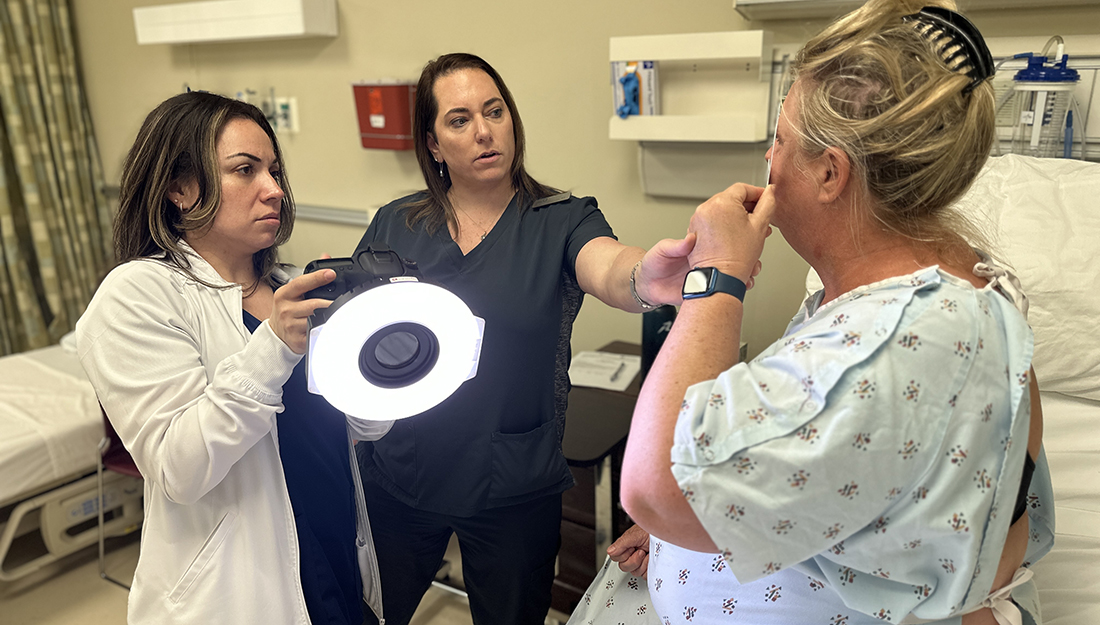- Mary Leigh Meyer
- Healthy Living, Nursing, Show on VR homepage, Trending
You Asked: How will I know I’m in menopause?
Plot twist: The answer simpler than you think

A woman in a red dress is standing confidently with her hands on her hips
You knew it was bound to happen someday, but so soon?! You’re not even 50 years old yet. A mood swing here, a few missed periods there…and is it warm in here? You start to wonder if you are going through menopause.
Perimenopause and symptoms
If you find yourself googling this question, then you are most likely transitioning to menopause. This transition period is called perimenopause, the period of time when the ovaries gradually produce less and less estrogen.
This reduction in estrogen most commonly manifests through unpredictable menstruation and can last for several years, which ultimately leads up to your last period. “You need to go a year without your period to be considered menopausal,” said Sharon Dormire, PhD, MSN, professor at the Texas A&M College of Nursing. “It is diagnosed retrospectively.”
During perimenopause, all women notice significant changes to their monthly cycles. They may notice their periods getting shorter or longer, or they experience inconsistent periods—whether it is a period every two months or every nine months—and they will likely not be able to predict their bleeding. Many women, but not all, will also experience mood swings as well as hot flashes and night sweats during the transition to menopause.
“One possible symptom that provides frustration during perimenopause is veryheavy periods,” Dormire said. “As you age, your ovaries are less responsive to the monthly cycle, so your brain releases a specific hormone to trigger egg production. As a result of this hormone, the ovary can release more than one egg in a given month, which ultimately produces more blood.” She noted this is why twins are more common for mothers at this age.
Menopause indicators
Some women experience a lot of symptoms during perimenopause, and some women experience very few. So how can you know you are getting close to menopause? Again, the only true indicator of menopause is that you have not had your period for 12 months.
Typically, in the United States, the average age for a woman’s last menstrual cycle is 52.4 years old. Women can experience these symptoms for up to four years before they actually experience their last menstrual cycle.
Symptoms after menopause
Women can also experience potentially uncomfortable symptoms like hot flashes, mood swings and vaginal dryness after their last period. “For one to two years after menopause, hot flashes are typically worse than before the last menstrual cycle,” Dormire said.
Ways to manage symptoms of menopause
Many of the menopause symptoms like mood swings and hot flashes have to do with the changing levels of estrogen in your body. Hormone therapy is a common treatment for menopause, but it is recommended you speak to your health care provider, as hormone therapy is not recommended for everyone, including women with a history of breast cancer.
Also, women may have different triggers for their hot flashes. Some common triggers are alcohol, caffeine, stress and tight clothing.
Dormire recommends having an honest and upfront conversation with your health care provider about your symptoms and possible treatments. “There are a lot of options that we did not have a few years ago. Hormone therapy is not just taking a pill anymore,” she said. “There are even vaginal creams and patches that are hormonally based, which limit the impact administered hormones have on the rest of the body.”
Women have also found success with using nonhormonal medication to treat hot flashes. Medicine usually given for pain or seizures as well as some antidepressants often offer relief.
No one way to treat menopause is better than the other. Because the symptoms vary so greatly from woman to woman, do not be afraid to try different management techniques. Speak with your health care provider to make a plan that is customized to you. If you are experiencing symptoms of menopause, do not feel helpless. There are plenty of ways to manage your symptoms and find relief.
Media contact: media@tamu.edu


